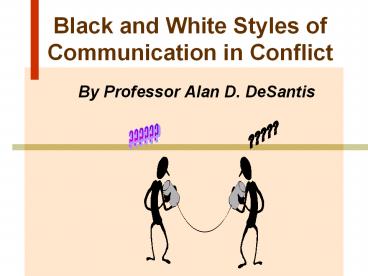Black%20and%20White%20Styles%20of%20Communication%20in%20Conflict - PowerPoint PPT Presentation
Title:
Black%20and%20White%20Styles%20of%20Communication%20in%20Conflict
Description:
1) Around 400 years ago, the English settled (invaded) North America ... Walking, dancing, worshipping, Black step shows, marching bands, cheerleading ... – PowerPoint PPT presentation
Number of Views:130
Avg rating:3.0/5.0
Title: Black%20and%20White%20Styles%20of%20Communication%20in%20Conflict
1
Black and White Styles of Communication in
Conflict
- By Professor Alan D. DeSantis
?????
??????
2
A Brief History of English
- 1) Around 400 years ago, the English settled
(invaded) North America - They brought their language customs settled
along Americas Eastern Coast - From Georgia to Massachusetts (the original 13)
- 2) With time, this spatial separation created
sub-dialects that are still heard today (about 12
of them) - New York vs. Mississippi vs. Appalachian vs.
Vermont Talk - Differences in accent, pace, vocabulary,
phrasing, grammar - 3) But perhaps the most distinctive of all
American dialects is Black English - Shaped by English, African, and Southern speech
3
English Comes to America
New England Dialect
New Jersey/York Dialect
Appalachia Dialect
Black Dialect
Southern Dialect
4
A Brief History of English
- 4) Through the course of the last 300 years,
Black English has developed its own vocabulary,
accent, rules for grammar, nonverbal cues, dress,
walk, and CULTURE. - From California to New Jersey to Mississippi,
Black English still shares many common linguistic
elements - 5) As with all languages, however, our American
dialects began to be culturally ranked - Since the seats of power (and ) ranged from
Washington to Boston, Standard English became
the way those people spoke
5
A Brief History of English
- 6) The Problem
- A) All who speak differently, are taught to feel
bad about their language patterns - Thus, the Southern, Appalachian, and Black
dialects are considered bad English - B) We forget that standard English is nothing
but a dialect that developed along side the 7
other American dialects (Black English being one
of the 7) - 7) While most of you in the class are familiar
with the Southern/Kentucky dialect, most of us
know very little about the Black Dialect - Also called Black English or Ebonics
6
7 Communication Differences
7
Communication Differences
- 1) Black English Dialect is Different
- As with all American dialects, Black English has
its own specific rules for 1) pronunciation (ax,
spoze, po-lice, aunt), 2) vocabulary (phat), 3)
syntax, 4) accent (all can recognize), and 5)
grammar (are be) - It is not a bastardized version of standard
English It is its own linguistic form with its
own laws of appropriateness. - It is every bit as legitimate as any dialect in
America (including North-Eastern, Southern, or
Midwestern English) - My boss Why cant those people speak right
- Whites uneducated unrefined
8
Communication Differences
- 2) Call and Response Communication
- Traced back to Africa
- The black church, jazz, movies, clubs, talk
- Dr. CCTs movie, Apollo, churches, dance floor
chanting, black classrooms (more interactive),
interpersonal exchanges (overlapping) - Whites interrupting, challenging, loud
- Blacks uninvolved and removed
9
Communication Differences
- 3) Personal Style (Kotchman)
- A) The desire to have an individual style
- automobiles (personalized), sports celebration
(Ali to Dion), dress (the 2 Tommys), names
(Tashaun vs. Bob), womens church hats - B) To differentiate from white culture
- Whites showing off, cockiness, not being a team
player - Blacks boring and conformist
10
Communication Differences
- 4) Styles in Conflict and Emotion
- Blacks are more animated, louder, expressive
- Anger joy are openly expressed
- For whites, rational means calm/quite
- White culture separates mind emotions
- Mask your true feelings
- Whites violent, less rational, unrefined,
childish - Blacks cold, dispassionate, unemotional
11
Communication Differences
- 5) Importance of Rhythm (Asante, Davis)
- Rhythm/groove permeates everything
- Walking, dancing, worshipping, Black step shows,
marching bands, cheerleading - Gospel, blues, R B, jazz, rock, and rap from
only 12 of our population - Research also shows that black talk is more
rhythmic and syncopated than white talk (there is
a grove) - Whites feeling out of synch
- Blacks feeling out of synch
12
Communication Differences
- 6) Black vocabulary is more dynamic
- White vocabulary is far more stable over time
- Black language is far more dynamic (perhaps the
most dynamic language in the history of the
world) - Why
- A) Language is fun, not just a tool
- B) Illustrates personal style (see 3)
- C) White appropriation (forced to keep changing)
- Whites too complicated to try
- Blacks too boring, cold, and unimaginative
13
Communication Differences
- 7) Nonverbal Cues
- Proxemics--Closer space
- Eye ContactReversed
- Greater while talking, less while listening
- Gestures--Greater use of body
- Handshakes, body movement, walk, etc...
- Touch--Higher touch culture (with each other)
- Volume of Speech--Loud Honest
- Whites too emotional and child-like
- Blacks too cold, removed, and dispassionate
14
Communication Differences
- 8) Playful Use of Language
- Playin Dozens, Signifying, Dissing, Dogin
- White culture sees language as a stable tool
- Strive to speak clearly, precisely, consistently
- Black culture see language as dynamic art
- Strive to speak creatively imaginatively
- Illustrates style, rhythm, vocabulary
- Whites insulted (not my momma) or confused
- Blacks dispassionate, no fun or humor
15
Concluding Thoughts
- 1) Remember, that all variations of English are
dialectseven Standard English - No one is objectively better than another
- 2) These differences make America the most
interesting and diverse country in the World - Do we really want all people to talk alike (talk
like me)? - Are you ready to give up your Southern dialect (
culture)? - Why should white America expect blacks to give up
theirs?































